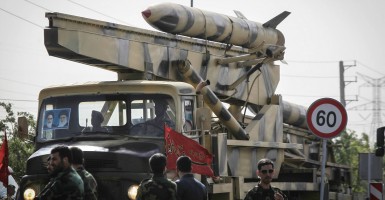So much for those who were hoping that the recently concluded—but clearly unfinished—nuclear deal with Iran would serve as the basis for a replay of President Nixon’s historic opening to China.
As the next phase of nuclear talks begins this week in Vienna, Tehran is on a tear.
This time it’s in Yemen where news accounts report that a convoy of Iranian cargo ships may be headed for the war-torn country—where a Saudi-led coalition has conducted an air campaign that began in late March.
It’s also been reported that Iran has moved some of its warships from its home waters in the Persian Gulf to the Gulf of Aden off Yemen to conduct “counter-piracy” operations, according to Tehran.
While unconfirmed, the suspicion is that the Iranian cargo ships are carrying weapons and/or supplies for the Houthis who have weathered a blistering few weeks of Operation Decisive Storm’s air strikes.
Providing arms to the Houthis would violate a recent U.N. Security Council resolution placing a weapons embargo on the rebels, whose offensive has pushed out the government of now-exiled Yemeni President Abed Rabbo Mansour Hadi.
The air campaign has likely destroyed many of the airfields through which Tehran might supply or resupply the Houthis, especially with game-changing air defenses (e.g., surface-to-air missiles) that would threaten the safety and security of Saudi-coalition pilots.
The Iranian warships are likely in the area to not only monitor Saudi and Egyptian ships and the conflict, but to potentially protect the convoy that may make its way to a Yemeni port to unload—whatever cargo that might be.
But it could be worse.
While many thought that the deployment of the USS Theodore Roosevelt aircraft carrier to the area to protect freedom of the seas was “unusual,” it may actually be a part of, but not the whole, story.
On MSNBC this week, President Obama said that “if there are weapons delivered to factions within Yemen that could threaten navigation, that’s a problem.” The use of the phrase “threaten navigation” is particularly interesting.
Assuming that Obama didn’t misspeak or mislead, what sort of Iranian weapons could jeopardize shipping lanes?
One possible answer is land-based anti-ship ballistic or cruise missiles. Iran has both types of missiles, which are designed to hold maritime chokepoints hostage and attack both military and commercial shipping.
This, of course, is just one possibility.
While risky for a number of reasons, if Iran transfers missiles (and Iranian technical help) to the Houthis, it endangers important transit lanes such as the Bab el-Mandeb strait, the Red Sea and Gulf of Aden.
It also creates a potential shift in the war’s dynamics. In other words, in possession of such weapons, the seemingly hapless Houthis—and their ally Iran—would gain leverage with the Saudi-led coalition in any negotiation over Yemen’s future.
It’s certainly an interesting notion—and the U.S. carrier (and its battle group) could play a role in dealing with such a delivery.
While we don’t know what’s hidden in the containers on Iran’s cargo ships—and Washington may not know exactly either—it’s clear that tensions with Tehran are far from over despite a possible nuclear deal.
Originally published in the Boston Herald
























